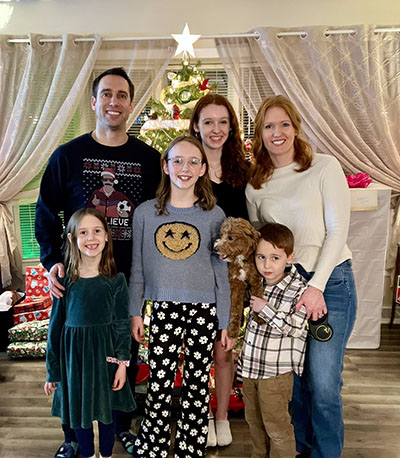
Peace of mind: How a Children’s Wisconsin partnership is helping families in Northeast Wisconsin
It was just 10 seconds. But that can feel like an eternity when you can’t see, hear or breathe.
That’s what happened to 10-year-old Maya on Monday, Jan. 8, 2024. It was lunchtime at school and she was in the cafeteria when suddenly everything stopped. She froze — fully conscious and aware. She couldn’t breathe. She couldn’t hear. She couldn’t move.
Then, just as suddenly, she was fine.
Maya was confused, startled, but shook it off and went back to lunch. When she got home that afternoon, she told her mom, Bridgid, what had happened. As a nurse and a mom, she was obviously concerned. She told her if it happened again, to tell her right away.
 “She never had headaches, migraines, any sort of health issues in the past,” said Bridgid. “I didn't know what was going on.”
“She never had headaches, migraines, any sort of health issues in the past,” said Bridgid. “I didn't know what was going on.”
Later that evening, as Maya was taking their dog for a walk, it happened again. This time it lasted a little longer and was accompanied by a bad headache. Bridgid wasted no time heading to the ThedaCare Emergency Department near their home in Neenah, Wisconsin.
As they waited to be seen, Bridgid’s nursing training kicked in. Was it a brain tumor? Was it meningitis? Encephalitis? Seizures? As she was going through all these possible diagnoses in her head, Maya suddenly gasped and started crying. It had happened again.
Once they were brought back, the ThedaCare doctor ran some tests to make sure Maya’s heart was functioning properly — it was. And since she didn’t have a fever that would indicate an infection, the doctor referred Maya for an appointment with the Children’s Wisconsin Neurosciences Center.
Behind the scenes, a Children’s Wisconsin partnership made it possible to get a neurological diagnostic test for Maya faster than previously expected.
The partnership is called Connected for Kids and it began in December 2021. It brings together Children’s Wisconsin, Bellin Health and ThedaCare to help improve the health and well-being of children and teens in Northeast and Central Wisconsin and the Upper Peninsula of Michigan. Through this partnership, Children’s Wisconsin is bringing additional pediatric services and specialists to the region, reducing the need for children and their families to travel for care. The partnership is also helping Children’s Wisconsin deliver better and more efficient care to patients from ThedaCare and Bellin Health through seamless coordination across each organization.
“Maya allowed us to use our new process,” said Matthew Buelow, MD, cardiologist and medical director of the Northeast Region of Children’s Wisconsin. “And we’re grateful we were able to deliver the care she needed right in her community.”
Quick, coordinated care
Thankfully, Maya was able to get a brain test, an electroencephalogram (EEG), scheduled at the Children’s Wisconsin Appleton Clinic for the very next day, with a follow-up appointment the day after that.
Discharged from the ThedaCare Emergency Department and back at home that evening, the episodes continued. And got worse.
“I stayed with her 24/7,” said Bridgid. “Her headaches got really bad and she was having dizziness and started not to be able to walk straight.”
The next day, they went to the Children’s Wisconsin Appleton Clinic for the EEG. Thanks to the partnership between ThedaCare and Children’s Wisconsin, Maya’s exam at Children’s Wisconsin was scheduled quickly and her results came back faster.
 In the past, if a child had an EEG done in the Northeast, it could take four to eight weeks to get the results. The individual health care systems simply didn’t have the capacity or coordination to get results more quickly. But now with this partnership, the Children’s Wisconsin neurology team can get EEG results within 24 hours.
In the past, if a child had an EEG done in the Northeast, it could take four to eight weeks to get the results. The individual health care systems simply didn’t have the capacity or coordination to get results more quickly. But now with this partnership, the Children’s Wisconsin neurology team can get EEG results within 24 hours.
“Maya’s family received results within 24 hours thanks to significant efforts to enhance IT and technology integration across the health care systems,” said Dr. Buelow. “This has led to improved quality, safety and experience for patients.”
Thankfully, Maya’s EEG was clean. She was not having seizures. But by now she had developed a fever. This new symptom led to a diagnosis of cerebellar ataxia, likely caused by a viral infection. Basically her episodes were a side-effect of her body’s immune system fighting the infection.
“Sometimes when your body is attacking a virus, it also attacks part of your body. In this case, Maya’s brain, the cerebellum, which is why she couldn't walk, talk or move,” said Bridgid. “This was the best case scenario because whatever virus it was would go away on its own.”
After a few days, the fever went away, and a couple weeks later, so did the dizziness and unsteadiness.
Peace of mind
Since that appointment, Maya is largely back to being her creative, loving and fun self. And her family is extremely grateful to have access to Children’s Wisconsin so close to home.
“It was very convenient and definitely added peace of mind to have specialized pediatric professionals so close,” said Bridgid. “It was bad weather that week — there were a few days with heavy snow, so it would have taken hours to get to Milwaukee. It was very nice to just be able to drive to Appleton and have that specialized care, and to be able to see someone and get answers so soon.”
Maya’s care experience is a great example of how Children’s Wisconsin is leveraging partnerships to deliver the right patient care, at the right time, at the right place.
“I used to work for Children's Wisconsin as a nurse about twelve years ago, and this was my first interaction just as a parent,” said Bridgid. “Honestly, everything was seamless. Everyone was friendly. Everything worked out really well.
Children's Wisconsin Resources

Written by
Evan Solochek
Writer
Related Stories
No related articles found.



